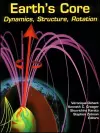
Earth's Core
4 contributors - Hardback
£68.95
Veronique Dehant works at the Royal Observatory of Belgium, where she is responsible for the Operational Directorate "Reference Systems and Planetology". She is also Extraordinary Professor at the Catholic University of Louvain (UCLouvain). She is an Academician (Member of the Royal Academy of Belgium, Science Class) since 2010, Foreign Member of the Paris Academy of Sciences since 2016 and has been awarded several prizes including the Descartes Prize of the European Union in 2003 and she has just been awarded the De Leeuw-Damry-Bourlart Prize, Prize in Fundamental Exact Sciences among the five FNRS research excellence prizes. In 2015 and 2020, she obtained an Advanced Grant and a Synergy Grant from the European Research Council. She is involved in processing data from instruments in several space missions, in particular of the RISE experiment (Rotation and Interior Structure Experiment) on board the InSight mission (Interior Exploration using Seismic Investigations, Geodesy and Heat Transport) currently on the surface of Mars.
Mioara Mandea is currently the Programme Manager for Solid Earth at the Directorate for Innovation, Applications and Science at Centre National d’Etudes Spatiales in Paris (French Space Agency). Over recent decades, she has been involved in many activities of the International Association of Geomagnetism and Aeronomy (both Secretary General and President), European Geosciences Union (General Secretary and Chair of Outreach Committee), American Geophysical Union (Chair of Education Award Committee), International Space Science Institute (Chair of Science Committee), Commission for the Geological Map of the World (President of the Sub-commission of Geophysical maps), to name the most important. Mioara Mandea has published more than 250 papers (publications in ISI journals, further journals, books and chapters in books, proceedings and reports),and has been involved in organising many workshops and conferences. She has also led several multi-partner research projects or work packages within projects at different national and EU levels. She has tutored PhD students from many countries around the world. She is a member of the Editorial Board of Surveys in Geophysics (from 2009) and of Solid Earth (from 2010) and co-Editor of several books (Springer, CUP). She has acted as reviewer for more than 120 manuscripts submitted to a broad range of journals and as referee for projects submitted to the ERC and to the National Science Foundations of France, Romania, Norway, Switzerland, Lithuania, Russia, USA and Portugal.Mioara Mandea is a member of the Academy of Romanian Scientists, Academia Europea, Académie Royale de Belgique, and the Russian Academy of Science. She received the International Award of AGU, the Petrus Peregrinus medal of EGU, the prestigious French “Ordre National de Mérite”, and Citoyenne d’Honneur de Comanesti (ville natale en Roumanie).
Anny Cazenave is director for Earth sciences at the International Space Science Institute, Bern, Switzerland and emeritus scientist at the ‘Laboratoire d’Etudes en Géophysique et Océanographie Spatiale’, Toulouse, France. Her research deals with the applications of space techniques to geosciences (geodesy, solid Earth geophysics, sea level change and climatic causes, land hydrology from space).
Lorena Moreira earned her PhD of Science in Physics from the University of Bern (Switzerland), studying temporal variability and climate induced changes on middle atmospheric ozone measured by a ground-based microwave radiometer (GROMOS) located at Bern. She has coauthored over 10 publications including Atmospheric Chemistry and Physics, Earth Planets and Space, Global and Planetary Change, Remote Sensing, Surveys in Geophysics, etc. Lorena Moreira is a postdoctoral fellow at the International Space Science Institute (ISSI, Bern, Switzerland) under the supervision of Dr. Anny Cazenave. Her current research focuses is on the study of variability of altimetry-based sea-level rise at global and regional scale and the influence of the sea-level budget components.